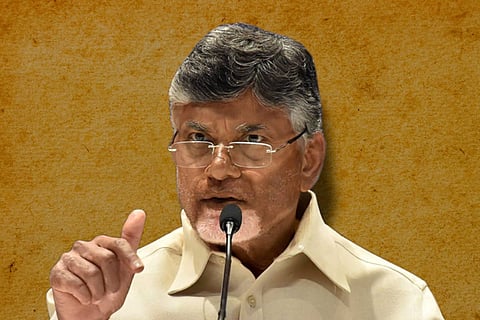

Having secured all three graduate constituency seats in the Member of Legislative Council (MLC) elections, the Opposition Telugu Desam Party (TDP) in Andhra Pradesh is optimistic. In a press meet held at the party’s central office on Sunday, March 19, along with top leaders of the party, TDP president N Chandrababu Naidu said that the election results were indicative of an anti-incumbent rebellion among the voters. He referred to TDP’s wins as a victory for the people, and added that by choosing TDP candidates, the electorate had placed their complete trust and confidence in the party.
The TDP has wrested the graduates’ MLC seats in both West and East Rayalaseema as well as in the north coastal Andhra region. Opposition party leaders have since claimed that this victory was a referendum by the people of north Andhra and Rayalaseema against the ruling YSR Congress Party (YSRCP)'s plan to establish three capitals in the state.
In the East Rayalaseema graduate constituency (Prakasam-Nellore-Chittoor), Kancharla Srikanth Choudhary of the TDP defeated Pernati Shyamprasad Reddy of the YSRCP after the counting of second preference votes, with a majority of more than 34,000. The loss came as a shock to the YSRCP, as the constituency has been a party stronghold for years. The TDP candidate for north coastal Andhra (Visakhapatnam, Vizianagaram, and Srikakulam districts), Vepada Chiranjeevi Rao too obtained the required votes in the second preferential counting and defeated YSRCP’s Sitamraju Sudhakar.
The West Rayalaseema graduate constituency (Anantapur-Kurnool-Kadapa), where TDP’s Bhumi Reddy Ramgopal Reddy emerged as winner, has meanwhile been embroiled in a controversy. Though YSRCP candidate V Raveendra Reddy had maintained a slim lead during the first round of counting, he fell short of the required number of votes to be declared the winner. The officials hence began counting the votes for second preferences, which eventually went in favour of the TDP.
Later, however, the TDP candidate along with party supporters staged a protest at the counting station alleging that he was not given the declaration certificate even after the returning officer announced him as the winner. The party president also took this to the notice of the Election Commission of India (ECI) and the Andhra Pradesh State Election Commission (APSEC), alleging that the declaration certificate has been withheld due to pressure from Chief Minister Jagan Mohan Reddy’s office.
The YSRCP also wrote to the ECI and the APSEC demanding that the votes be counted again, claiming that there were irregularities in counting and that YSRCP votes have been transferred to TDP bundles.
According to political analyst Telakapalli Ravi, the TDP’s victory in the graduates’ seats is definitely a setback to the YSRCP. “It demonstrates an anti-establishment sentiment among the graduates, particularly among those who are unemployed,” he said.
In addition, the TDP supremo’s strategy to tie up with the Left-aligned Progressive Democratic Front (PDF) for second priority votes have also helped them greatly, especially in the north coastal Andhra constituency, Ravi said. “Nearly 8,000 second preferential votes came via the PDF in the north coastal constituency. But the TDP has not acknowledged this enough,” he said. Pawan Kalyan’s Jana Sena Party sending a strong message to its voters against voting for the ruling party has also been a contributing factor, he added.
Ravi said that caste has also played a significant role in the election, pointing out that north coastal Andhra MLC-elect Chiranjeevi Rao belonged to the Kapu community, a numerically strong Telugu caste. “Chiranjeevi is also a well-known figure among the youngsters. He is a popular economics coach in the city and is widely known as ‘Economics Chiranjeevi’,” he said.
Political analyst and professor K Nageshwar believes that the election results from graduate constituencies cannot be considered as the opinion of the general public, as it is limited to only a section of registered graduate voters. “But it still sends a strong message about the dissatisfaction among the educated class of the state. The vote was against YSRCP, not in the favour of TDP,” he said.
Development is a significant subject of debate among the urban middle class, Nageshwar said. “Most middle class people do not care about welfare schemes. They are bothered about what immediately affects them — factors such as roads, employment etc. But the government has not paid much attention to this,” he said. He added that while development is a matter of concern in rural areas as well, it is mostly balanced out by the popularity of welfare schemes.
Meanwhile, Sajjala Ramakrishna Reddy, Advisor to the Government of Andhra Pradesh for public affairs, told the media that the [graduate constituencies] did not represent the lakhs of beneficiaries of welfare schemes. “We might not have done well in understanding this particular section of voters. But teachers have shown their support to us. Moreover, considerable votes were polled for our candidates. The Opposition candidates were able to poll more votes because of their alliance with the PDF,” he added.